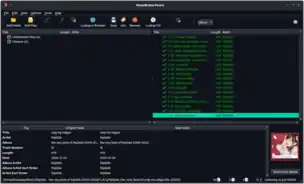MusicBrainz Picard
MusicBrainz Picard is a free and open-source software application for identifying, tagging, and organising digital audio recordings.[3] It was developed by the MetaBrainz Foundation, a non-profit company that also operates the MusicBrainz database.
 | |
 MusicBrainz Picard 2.5.5 running in the KDE desktop environment | |
| Developer(s) | MusicBrainz |
|---|---|
| Stable release | |
| Repository | |
| Written in | Python |
| Operating system | Linux, macOS, Windows |
| Type | tag editor, acoustic fingerprinter |
| License | GPL 2 or later |
| Website | picard |
Picard identifies audio files and Compact Discs by comparing either their metadata or their acoustic fingerprints with records in the database.[3] Audio file metadata (or "tags") are a means for storing information about a recording in the file. When Picard identifies an audio file, it can add new information to it, such as the recording artist, the album title, the record label, and the date of release.[4] In some cases, it can also add more detailed information, such as lists of performers and their instruments. The source of this information is the MusicBrainz database, which is curated by volunteers. The more information the database has about a recording, the more Picard can embed in users' audio files.
MusicBrainz Picard has tag editing features, and is extensible with plug-ins. It is named for Captain Jean-Luc Picard, a character in the US television series Star Trek: The Next Generation.
Development
Picard began as a tag editor called the MusicBrainz Tagger, which was the work of MusicBrainz founder Robert Kaye and other volunteers. It was developed in the Python programming language, and ran only on Microsoft Windows operating systems.
This early incarnation of the program could identify songs based on tags or MusicDNS acoustic fingerprints. However, Kaye saw that it needed cosmetic and functional improvements.[5] Streaming media company RealNetworks took an interest in MusicBrainz, and gave the developers a grant to improve the Tagger software.[5]
As a sponsor of the development project, RealNetworks asked Kaye to come up with a project code name.[5] Since Kaye was trying to make a "next-generation tagger", he thought of the science fiction television series Star Trek: The Next Generation, in which Patrick Stewart plays the role of Captain Jean-Luc Picard.[5] Although Kaye intended the name Picard to be temporary, MusicBrainz Picard remains the official name of the program.[5]
With funding from RealNetworks, MusicBrainz developers designed a new user interface for Picard. When the new software identified tracks, it grouped them by album in a collapsible tree view. The developers also switched from a software library called wxPython to another called PyQt, and ported Picard to the operating systems Linux and macOS.
In 2009, Picard's developers replaced the MusicDNS acoustic fingerprinting system with AcoustID.
In 2017, Picard's development resumed, led by Sambhav Kothari.[6][7] Progressing at a rapid pace, its back-end underwent a lot of changes, along with the switch to Python 3, PyQt5 and a new and improved UI.[8] Picard's development version was also made available on PyPi, supporting Windows, Linux and macOS.[8]
Supported file formats
Picard supports these audio file formats:[9]
| Audio file format | Data compression | Metadata container |
|---|---|---|
| AAC | Lossy | iTunes MP4 |
| Apple Lossless | Lossless | iTunes MP4 |
| FLAC | Lossless | Vorbis comment |
| Monkey's Audio | Lossless | APEv2 tag |
| MP3 | Lossy | ID3 |
| Musepack | Lossy | APEv2 tag |
| Ogg Vorbis | Lossy | Vorbis comment |
| OptimFROG | Lossless | APEv2 tag |
| Opus | Lossy | Vorbis comment |
| Speex | Lossy | Vorbis comment |
| TTA | Lossless | ID3 |
| WAV | Lossless | N/A |
| WavPack | Lossless | APEv2 tag |
| Windows Media Audio | Both | ASF |
References
- "Picard 2.5.5 released". MusicBrainz/MetaBrainz blog. Retrieved 22 December 2020.
- "Picard News". GitHub. Retrieved 22 December 2020.
- Staff writer (28 July 2011). "MusicBrainz Picard at a Glance". PC World. IDG Consumer & SMB. Retrieved 14 September 2015.
- Lightner, Rob (11 June 2012). "Tag your music files correctly with MusicBrainz Picard". CNET. CBS Interactive. Retrieved 14 September 2015.
- Kaye, Robert (10 December 2012). Robert Kaye of MusicBrainz. Music Tech Talks. London: Music Tech Fest. Retrieved 21 April 2017 – via YouTube.
- "Picard 1.4 released". MusicBrainz/MetaBrainz blog.
- "Community Recap Q1 2017". MusicBrainz/MetaBrainz blog.
- "Picard 2.0 dev available via PyPi". MusicBrainz/MetaBrainz blog.
- "MusicBrainz Picard FAQ § File Formats". Retrieved 15 September 2015.
External links
| Wikimedia Commons has media related to MusicBrainz Picard. |
- Official website
- MusicBrainz Picard entries in the MusicBrainz Blog